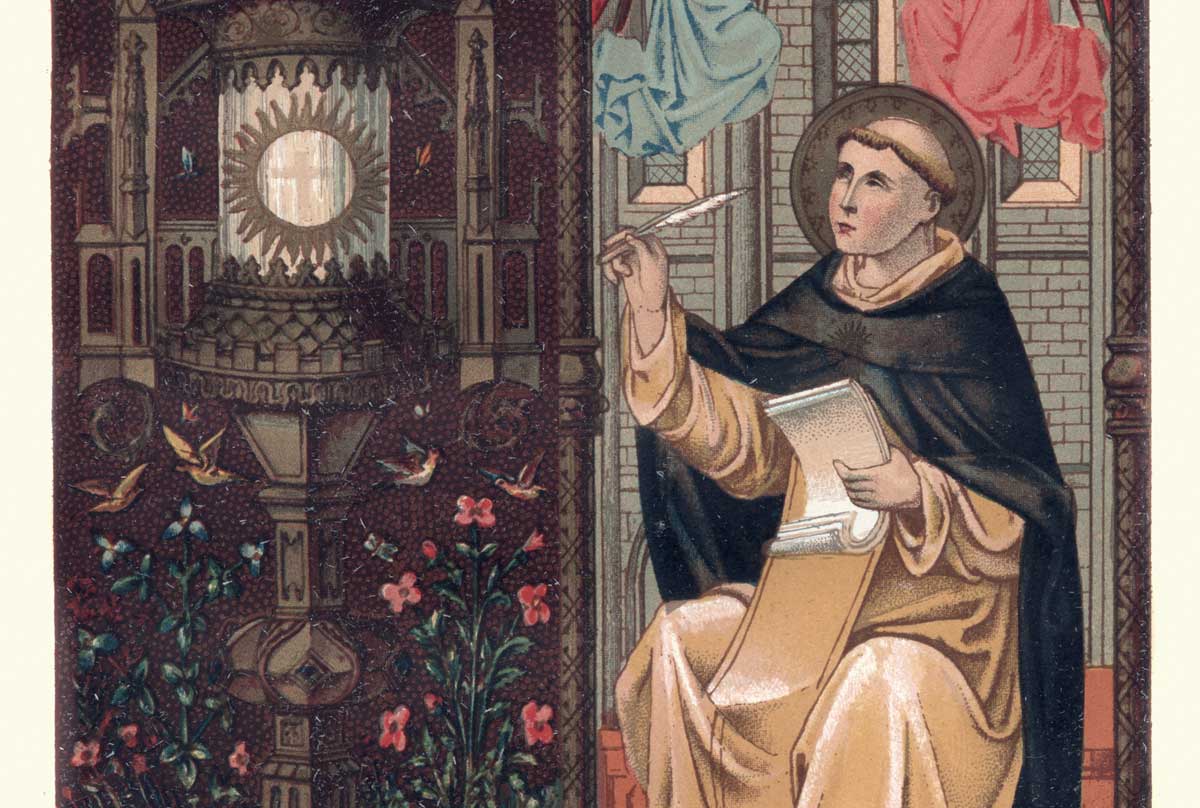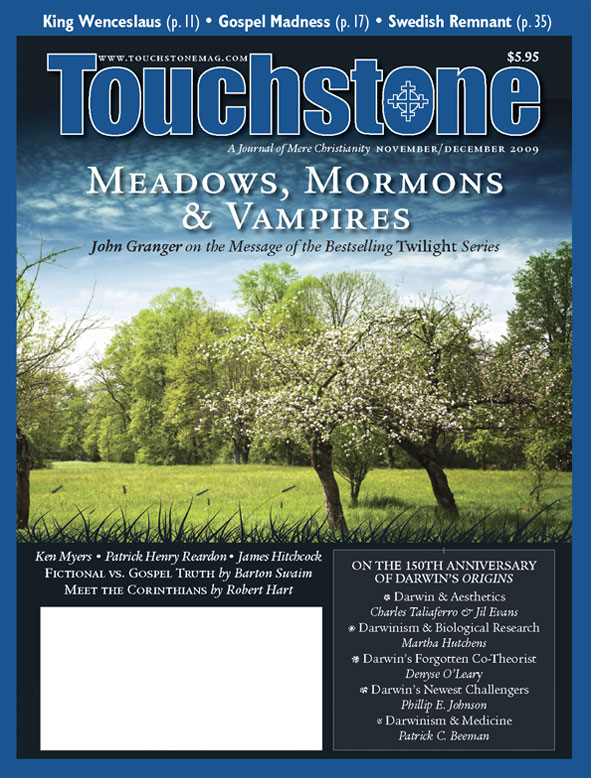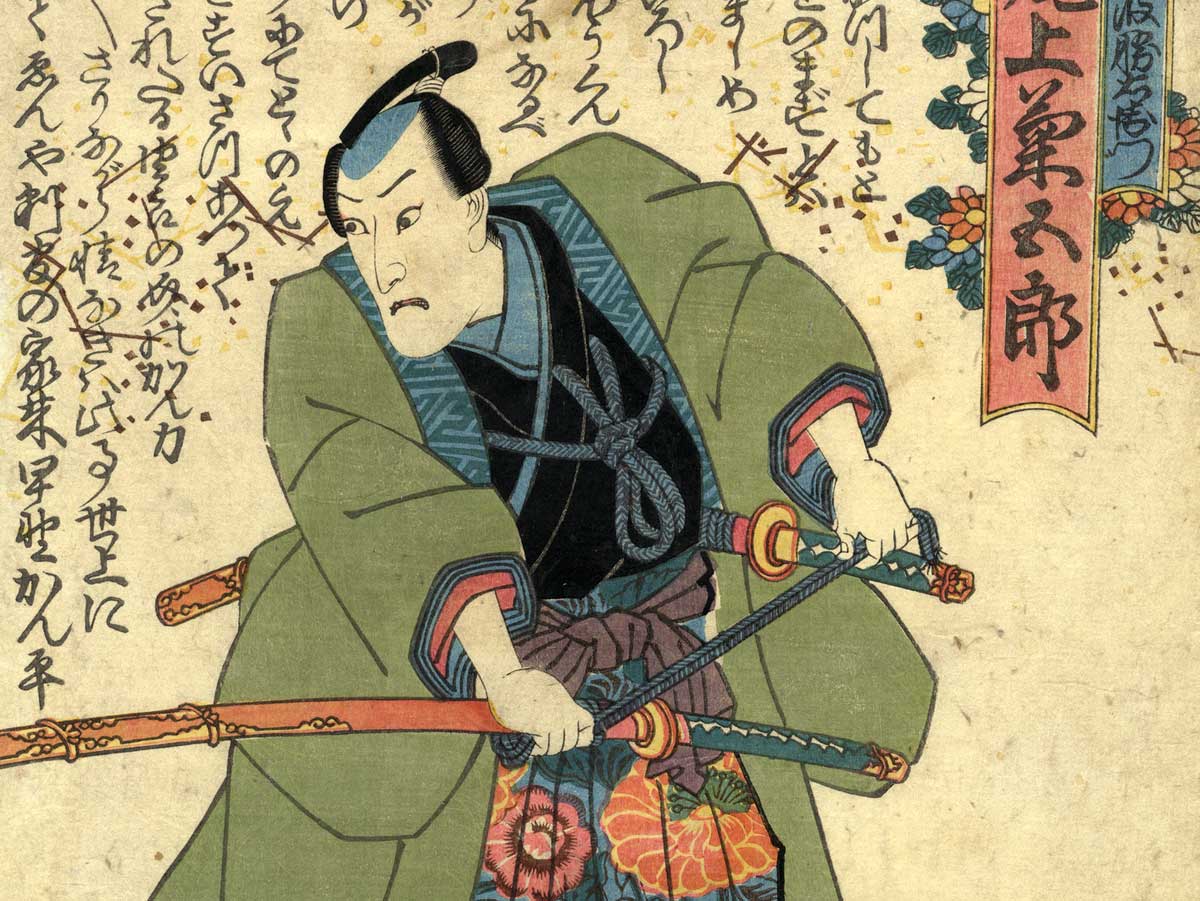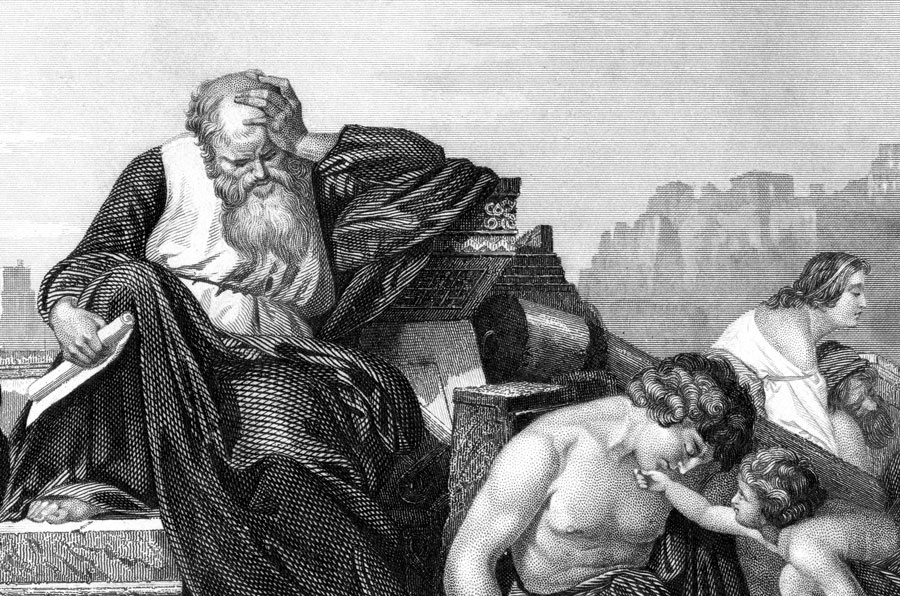Charles Darwin, M.D.
Patrick C. Beeman on the Healing Arts as an Accessory to Evolution
You normally don’t find panegyrics among reports on randomized-controlled trials and articles on abstruse themes like hyperphosphatemia. Nevertheless, the February 11, 2009 issue of the Journal of the American Medical Association ( JAMA) might just as well have been subtitled “An Encomium to Darwin.” Granted, February was the two-hundredth anniversary of his birth, and he remains an important, if infamous, figure in the history of ideas. But one reads this issue of JAMA with the sense that Darwinism—including all its extra-scientific implications—is just as important to the profession of medicine as molecular genetics, pharmacology, or anatomy. But should it be?
Of course, in the scientific community—medicine included—questioning Darwinism is equivalent to denying the epidemiologic efficacy of vaccination or the antibiotic power of penicillin. They have a word for people who do such things: quacks. A doctor would do better to promote phrenology. Still, does Darwinism—considered as a kind of pan-evolutionary theory of everything—really need to be part of the physician’s armamentarium?
Theory Informs Practice
James P. Evans seems to think so. In “The Voyage Continues: Darwin and Medicine at 200 Years,” in the aforementioned issue of JAMA, he takes up Theodosius Dobzhansky’s maxim, “Nothing in biology makes sense except in the light of evolution,” and substitutes “medicine” for “biology.” He then says that this attitude “explains the increasing relevance of Darwin’s work to modern medicine and mandates a shift in the training of medical students.”
To be sure, calls for changes or shifts in the undergraduate medical curriculum are neither new nor particularly exciting. In fact, they are as common as flu cases during a pandemic, and to some—including this author—just as unwelcome. The distinction of Evans’s proposal lies in its desire for a sweeping adherence to Darwinian thought as a foundation for medical education.
As a medical student—at once an observer of and limited participant in patients’ care—I have come to see and experience how ideology can influence medical practice. I have learned that the act of healing goes beyond what is written on a prescription pad. A patient’s experience is shaped, for good or ill, by the theory of medicine that informs his physician’s practice—whether consciously or unconsciously.
The philosophy that informs medicine can either transform a physician into a healer in a deep and true sense of the word or transmogrify him into an agent of the culture of death and an avowed enemy of human dignity. Which do we get when one’s first principles of medicine are derived from Darwinian philosophy?
Darwinian Dictates
I was recently in clinic while a physician was counseling a teenage patient who had a disease with a strong genetic component. Many of his family members also had the disease. The physician looked at the teenager and said, “Do not pass this gene on to your offspring. You have to end this thing here.” He stopped just short of telling the patient that he had a moral duty not to procreate. As if he had no right to become a parent because he might pass on a particular gene—or as if his children’s lives would not be worth living if they happened to inherit it! I stood there, incredulous. When did enforcing “survival of the fittest” and ensuring that only the strong have children become part of the doctor’s vocation?
I have heard sentiments like this from other physicians and residents too many times to count—statements such as “This person should not have children,” or “People should have to get a license to have kids; some people just aren’t fit to be parents,” or “She should have to get her tubes tied. Five kids are too many.”
Saddest of all, I have witnessed genetically deformed babies inhumanely discarded in buckets after having been aborted for no other crime than that they bore a particular set of genes. These babies were not much smaller than my own children were at birth. What a marked contrast between the hopeful, shining eyes of a newborn and the wretchedly peaceful eyes of a child offered up on the altar of eugenics. But genes are destiny in the Darwinian worldview, so bequeathing good ones becomes a moral imperative.
To be fair, in the same issue of JAMA, a different author avers that Charles Darwin would have challenged the medical community “to be at the forefront of developing ethical and humane applications for the discoveries being made” in genetics. Whether or not this is an accurate statement of Darwin’s opinion, not everyone today would likely share it, and even if they did, they wouldn’t all agree on what such an ethics should look like. In any case, Evans asserts that
Evolutionary theory is as relevant to the teaching of medicine as to medical practice. Just as the periodic table of the elements brings structure to the study of chemistry, an evolutionary approach to medical education provides a logic to understanding the human body in health and disease. Evolution explains why humans are the way they are, ultimately answering the most fundamental questions asked by medical students, ie [sic], those that begin with why. Given the centrality of evolutionary theory to a deep understanding of the human body, it is possible to envision an entire medical curriculum built around evolution, from anatomy and molecular genetics to pathogen-host interactions.
This is disturbing because the words “entire medical curriculum” imply that evolutionary theory would also guide the study of medical ethics. At the very least, Evans conspicuously fails to mention the tendency of Darwinian theory to devolve into eugenics, and to acknowledge the need for a medical ethic that would restrain this tendency. Perhaps he thinks that Darwinian medicine has no place for medical ethics at all.
Which Comes First?
Hippocrates had a different view. In On Ancient Medicine he observes with a bilious touch that
certain sophists and physicians say that it is not possible for any one to know medicine who does not know what man is (and how he was made and how constructed), and that whoever would cure men properly, must learn this in the first place. . . . But I think whatever such has been said or written by sophist or physician concerning nature has less connection with the art of medicine than with the art of painting.
He may be right. How often do proponents of Darwinism speak of its elegance and beauty as a theory? Much like describing a painting, one might say.
Hippocrates goes on to inquire whether one needs to know the origins of man before learning medicine, or whether origins are better learned after comprehending the whole of medicine. Should Darwinian theory come first, or should medicine—including medical ethics—take first place? Should ethical matters such as learning how to understand and accommodate the irrepressible spiritual needs of the suffering person, and learning how to communicate with patients as partners in a healing relationship—i.e., the really important “stuff” about medicine which sets it apart from “mere science”—be taught prior to and apart from Darwinian theory, or should Darwinism be an overarching principle that encompasses all of medicine, rather than just a useful way of explaining drug resistance, the vermiform appendix, and the like?
Evans goes on to mention one medical school that presents a formal lecture on evolutionary medicine to first-year medical students, in the “hope that an early introduction will allow them to frame their ensuing medical experiences in an evolutionary context.” Indeed, medical students and physicians are already doing just this. By now, there may be no area of medicine untouched by Darwinism.
Serving the “Unfit”
For the record, the quarrel is not so much with the idea of change through time, or with natural selection, or with the explanatory power of evolutionary theory regarding such things as pathogen virulence or antibiotic resistance—that is, with evolution as a biological theory. Rather, what frightens me as a future physician is the extension of ideas such as “the survival of the fittest” into the clinical encounter where doctors and patients wrestle with the meaning of life and death and suffering. Here, this ideology makes a wreck of the doctor-patient relationship and brings shame to the profession of medicine, whose raison d’etre is healing, not serving the false god of social fancy. As a profession, medicine is increasingly embracing the eugenic mentality and has already forgotten the lessons of our not too distant past, lessons taught, for instance, by the infamous (to put it mildly) Josef Mengele.
I am willing to grant the possibility that Darwinian evolution, as a scientific theory, is true. But I refuse to believe that Darwinian evolutionary theory can serve as a philosophical foundation for medicine. I am fairly certain that patients don’t want this, either. After all, which is better? To be treated as a person bearing dignity or simply as an organism bearing a particular configuration of genes?
Physicians who practice in and take to heart the mission, as one Catholic hospital puts it, to “extend the healing ministry of Jesus” become models of Christus Medicus in their humble service of Christus Patiens. I have been privileged to witness this kind of charity, and I realize how important it is that a philosophy of medicine—even, perhaps, a theology of medicine—precede the actual ministrations of physicians in their clinics or on the wards. If a physician’s actions are informed by a worldview in which human dignity is uppermost, then the physician becomes more than just a technician or a practical scientist when he is engaged in the work of serving the suffering Christ through suffering people.
Our Lord said, “It is not the healthy who need a doctor, but the sick” (Matt. 9:12). Isn’t the point of medicine to serve those who might be called “unfit”? Medicine, as Hippocrates noted, “was discovered for the health of man, for his nourishment and safety.” Certainly it was not meant for his destruction. A Darwinian theory of medicine accommodates the fit and healthy very well. But where does that leave the profession of medicine and its practitioners? Where does that leave the unfit, the infirm, the handicapped, the aged, the unborn, the defective, and the genetically ill? All told, patients deserve more than Darwin.
Patrick C. Beeman was formerly a lecturer in philosophy at Cleveland State University. He is currently the president of the Catholic Medical Students Association and in 2008 was a Pellegrino Fellow at the Georgetown University Center for Clinical Bioethics. He is a medical student at the University of Toledo and attends Holy Rosary Cathedral with his wife and two children.
subscription options
Order
Print/Online Subscription

Get six issues (one year) of Touchstone PLUS full online access including pdf downloads for only $39.95. That's only $3.34 per month!
Order
Online Only
Subscription

Get a one-year full-access subscription to the Touchstone online archives for only $19.95. That's only $1.66 per month!
bulk subscriptions
Order Touchstone subscriptions in bulk and save $10 per sub! Each subscription includes 6 issues of Touchstone plus full online access to touchstonemag.com—including archives, videos, and pdf downloads of recent issues for only $29.95 each! Great for churches or study groups.
Transactions will be processed on a secure server.
more on evolution from the online archives

23.6—November/December 2010
Darwin, Design & Thomas Aquinas
The Mythical Conflict Between Thomism & Intelligent Design by Logan Paul Gage
more from the online archives
calling all readers
Please Donate
"There are magazines worth reading but few worth saving . . . Touchstone is just such a magazine."
—Alice von Hildebrand
"Here we do not concede one square millimeter of territory to falsehood, folly, contemporary sentimentality, or fashion. We speak the truth, and let God be our judge. . . . Touchstone is the one committedly Christian conservative journal."
—Anthony Esolen, Touchstone senior editor











